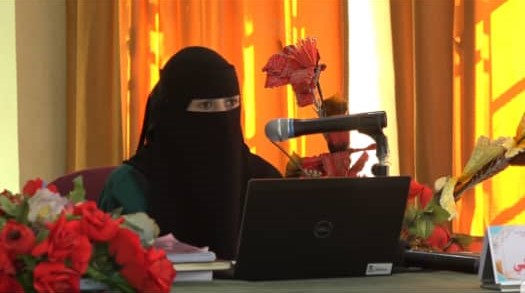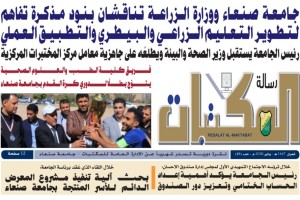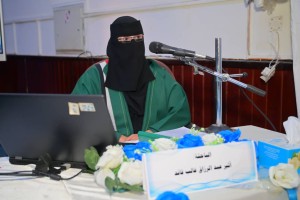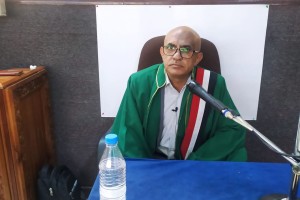Public MA Viva-Voce Examination of Ms. Nahid Ali Abdu Al-Akhaly, from the Department of English Language and Literature, Faculty of Arts & Humanities – Sana’a University
- Categories Letters and Promotions - Graduate Studies, news, Regulations - Postgraduate Studies
- Date November 25, 2024

Ms. Nahid Ali Abdu Al-Akhal has successfully awarded her MA degree with distinction from the Department of English Language, majoring in “Applied Linguistics” Faculty of Arts and Humanities, Sana’a University. She achieved a remarkable grade of 93% for her thesis titled “A Morpho-syntactic Analysis of Adjectives in English and Arabic: A Comparative Study,” which was defended on Sunday, 23 Jumada I 1446 Hijri, corresponding to November 24, 2024.
The Viva-Voce Committee, which was formed based on a resolution issued by the Post-Graduate Studies and Scientific Research Council, consisted of the following:
1. Prof. Mohammad Shoaie Damoum, External Examiner, Hajjah University, Chair.
2. Prof. Hamed Shoaie Al-Mogarri, Main Supervisor, Sana’a University, Member.
3. Dr. Ahmed Mohammad Al-Bakri, Internal Examiner, Sana’a University, Member.
The primary objective of the thesis was to investigate the morphological and syntactic characteristics of adjectives in both English and Arabic, with an emphasis on identifying similarities and differences between the two linguistic systems. Additionally, the study aimed to predict potential challenges arising from these differences and to elucidate their implications.
Key findings of the research include:
1. The English language predominantly relies on word order, whereas Arabic depends on word endings.
2. Morphological changes are utilized in English, while Arabic employs patterns and necessitates agreement in gender, number, and case.
3. English demonstrates flexibility but may exhibit inconsistencies, while Arabic is systematically organized based on roots and patterns.
4. Adjectives in English can be positioned flexibly, while Arabic adjectives must agree with and follow their corresponding nouns.
5. The placement of adjectives before nouns in English facilitates quicker comprehension, whereas in Arabic, this arrangement enhances descriptive detail.
In her thesis, Nahid also proposed several recommendations, such as:
1. Developing educational programs that emphasize the inflection of adjectives in Arabic and clarify their grammatical roles in English.
2. Organizing comparative linguistic workshops alongside practical applications of grammatical theories to enhance students’ proficiency in using adjectives correctly.
3. Encouraging future research focused on the interaction of adjectives within sentences and their usage in literature, media, and translation to improve understanding of grammar and communication.
The Viva-Voce was attended by several academics, researchers, students, and several colleagues and family members of the researcher.
Discover more from Sana'a University
Subscribe to get the latest posts sent to your email.






